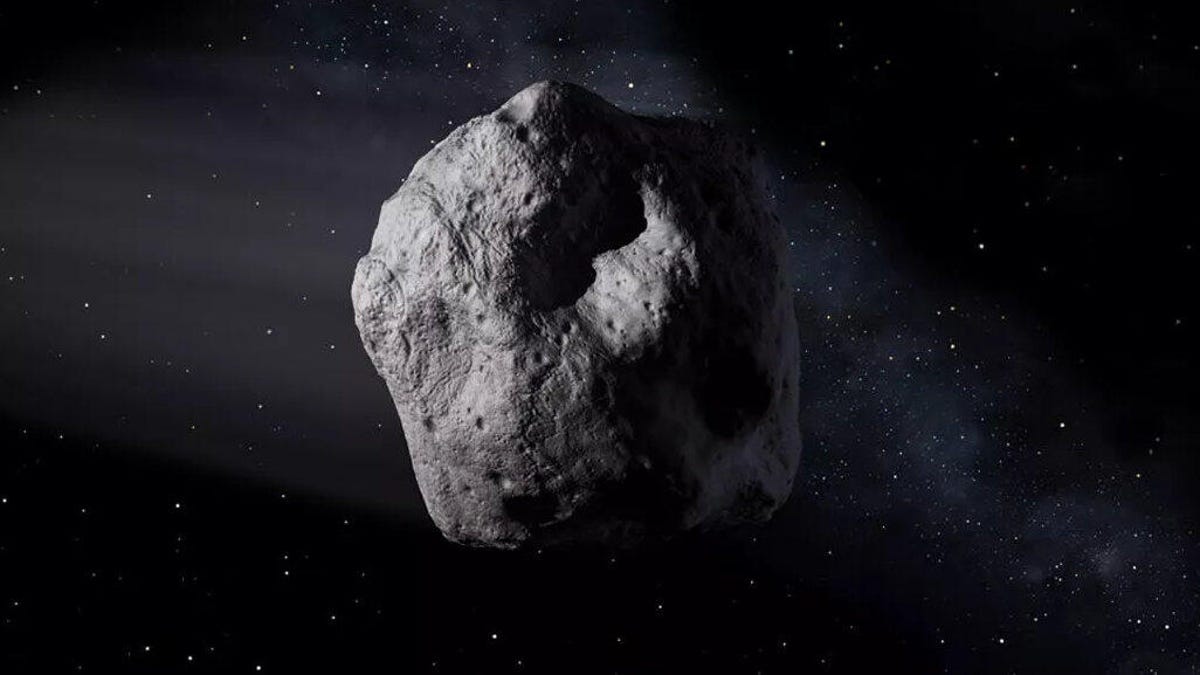Apophis, the most intimidating asteroid around, is coming in for a visit
Don't worry, it's not going to hit us. Promise.

Apophis is one of the 10 riskiest asteroids, according to the ESA.
Apophis, the Egyptian god of chaos and darkness is in the neighborhood again. Actually, it's just a giant asteroid named after the ancient demonic snake deity, and it's making a close approach of our planet.
Officially known as 99942 Apophis (2004 MN4), the space rock is wider than three football fields, and at one point, scientists estimated it had about a 3 percent chance of hitting Earth during an upcoming close pass in 2029.
A 3 percent chance of impact might sound like pretty good odds, but when it comes to asteroids and other near-Earth objects, especially one as large as Apophis, that's a terrifyingly high probability. For some context, Apophis could be about 10 times the size of the meteor that exploded in the atmosphere over Russia in 2013, sending out shock waves that shattered thousands of windows on the ground, injuring hundreds.
Right now, according to the European Space Agency, only one known asteroid has a greater than one-in-a-hundred chance of hitting us. That's little eight-meter (26 foot) wide asteroid 2010 RF12. It's currently estimated to have about a 7 percent chance of impacting Earth in the year 2095. Of course, by then we might have more observations that reduce the chance of impact, and its small size means it would mostly burn up in the atmosphere anyhow (it would be significantly smaller than the 2013 Russian meteor).
Apophis is an Aten-type potentially hazardous asteroid with a diameter of 370 metres. It was discovered at Kitt Peak on June 19, 2004. Apophis makes a close approach to Earth on March 6th, 2021 at a distance of 0.1126 AU(16.8 million km. #IAWN @AsteroidDay @QHYCCD @RoyalAstroSoc pic.twitter.com/2WQslHIfdG
— Northolt Branch Obs (@NBObservatories) February 11, 2021
This is all to say that Apophis is really scary by comparison. Fortunately, though, as scientists have observed the intimidating asteroid over the past decade, they've managed to rule out any possibility of impact in 2029 or during another close pass in 2036.
Its visit in 2029 will still be breathtakingly close, however, when it'll pass by at an altitude comparable to that of some of our artificial satellites.
The big rock will also make a close approach on March 5, 2021. While it'll remain more than 40 times farther out than the moon this time around, it'll be the closest Apophis comes between now and 2029, and astronomers are taking advantage of the opportunity to study the potential bringer of chaos a little closer.
Professionals are already pointing telescopes at Apophis, but citizen scientists are also being encouraged to get the big rock in their sights.
"With the demise of the Arecibo telescope, it has become more difficult to accurately measure the position of asteroids during a flyby," explains Franck Marchis, senior astronomer at the SETI Institute and chief scientific officer at Unistellar, which sells an autonomous smart telescope, eVscope. Marchis is encouraging eVscope owners to help observe Apophis later this month.
Scientists will be using this year's flyby as a sort of test run for the big day in 2029, which'll be a historic opportunity to observe a true cosmic big fella up close.
And it'll also provide more data to hopefully rule out a potential impact in 2068. The odds of that happening are currently no better than one in 300,000, but it would always be better to bring that number down to zero.
Follow CNET's 2021 Space Calendar to stay up to date with all the latest space news this year. You can even add it to your own Google Calendar.

